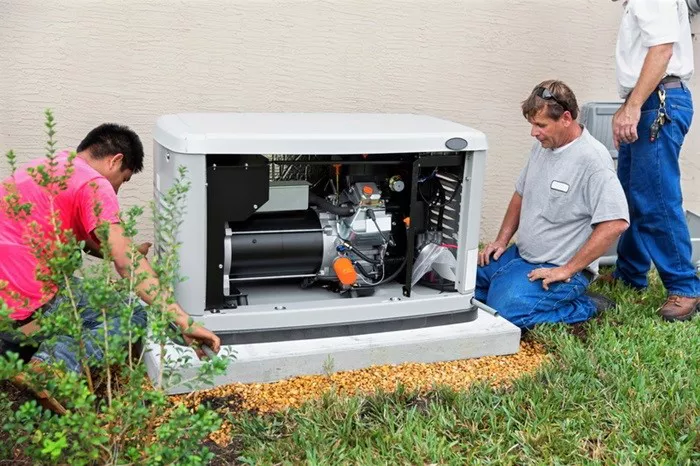When planning for a whole house generator, understanding the propane consumption is crucial. Propane is a common fuel choice for generators due to its efficiency and long shelf life. However, knowing how much propane your generator will need can help you ensure you have an adequate supply during power outages. This article will explore the factors influencing propane consumption, how to estimate usage, and how to manage your propane supply effectively.
Understanding Propane Consumption in Generators
A whole house generator’s propane consumption depends on several factors, including the generator’s size, load, and efficiency. By understanding these factors, you can better estimate your propane needs.
Generator Size and Power Output
The size of the generator directly impacts propane consumption. Larger generators with higher power outputs consume more propane. For instance, a 20 kW generator will use more propane than a 10 kW generator when operating under the same load.
Load and Usage Patterns
The load you place on your generator also affects propane usage. A generator running at full capacity will consume more propane than one running at a lower load. Additionally, how often and for how long the generator operates will influence overall propane consumption.
Generator Efficiency
Modern generators are designed to be more fuel-efficient. However, efficiency can vary between models. Check the manufacturer’s specifications for fuel consumption rates to get an accurate idea of how much propane your generator will use.
Calculating Propane Usage
To estimate how much propane you need, you’ll need to know your generator’s fuel consumption rate. This rate is usually expressed in gallons per hour (GPH) at a given load.
Fuel Consumption Rates
A typical whole house generator consumes approximately 0.5 to 1 gallon of propane per hour per kW of power output. For example, a 20 kW generator might use between 10 and 20 gallons of propane per hour when operating at full load.
Estimating Total Propane Needs
To estimate your total propane needs, multiply the generator’s hourly fuel consumption rate by the number of hours you expect to use the generator. For instance, if your generator consumes 15 gallons per hour and you anticipate using it for 24 hours, you’ll need 360 gallons of propane (15 gallons/hour × 24 hours).
Managing Your Propane Supply
Effective management of your propane supply ensures that you have enough fuel during emergencies and helps you avoid running out unexpectedly.
Sizing Your Propane Tank
Choosing the right size propane tank is essential for ensuring a sufficient supply. The size of the tank should match your generator’s needs and your anticipated usage. Common tank sizes include 120-gallon, 250-gallon, and 500-gallon tanks. Larger tanks provide longer run times and reduce the frequency of refills.
Regular Monitoring and Refills
Regularly monitoring your propane levels and scheduling timely refills can prevent running out of fuel. Many propane suppliers offer automated refill services to ensure you always have enough propane.
Preparing for Emergencies
During power outages, you may need to rely on your generator for extended periods. Keep extra propane on hand and ensure your storage area is safe and accessible.
Practical Tips for Efficient Propane Use
Maximizing the efficiency of your generator can reduce propane consumption and extend run times.
Perform Regular Maintenance
Regular maintenance, such as changing the oil and air filters, helps keep your generator running efficiently. An efficiently running generator consumes less propane.
Use Energy-Efficient Appliances
Reducing the load on your generator by using energy-efficient appliances can lower propane consumption. Turn off non-essential devices and appliances when the generator is running.
see also: TOP 4 Whole Home Solar Generators
Consider Generator Upgrades
Upgrading to a more fuel-efficient generator model can reduce propane consumption. Newer models often have improved efficiency and lower fuel consumption rates.
Conclusion
Understanding how much propane your whole house generator will use is crucial for effective planning and management. By considering factors such as generator size, load, and efficiency, you can accurately estimate your propane needs. Proper management of your propane supply, along with regular maintenance and efficient usage practices, will ensure your generator operates smoothly during power outages.
FAQs:
How often should I refill my propane tank?
Refill frequency depends on your generator’s fuel consumption and how often you use it. Regularly monitor your propane levels and schedule refills based on your usage patterns.
Can I use other fuels for my generator?
While propane is a popular choice, some generators can run on natural gas or diesel. Check your generator’s specifications to determine compatible fuel types.
How do I calculate the size of the propane tank I need?
Consider your generator’s fuel consumption rate, the anticipated usage time, and your budget when selecting a propane tank size. Larger tanks provide longer run times and reduce the need for frequent refills.
What should I do if my propane runs out?
If you run out of propane, turn off your generator immediately and arrange for a refill. Once the tank is refilled, you may need to follow the manufacturer’s instructions for restarting the generator.
How can I improve my generator’s fuel efficiency?
Regular maintenance, using energy-efficient appliances, and upgrading to a newer, more efficient model can all help improve your generator’s fuel efficiency and reduce propane consumption.
related topics:
- 3 Best Dual Fuel Whole Home Generators
- TOP 4 Whole Home Solar Generators
- Why Choose Cummings Whole Home Generators

